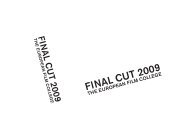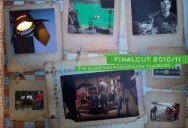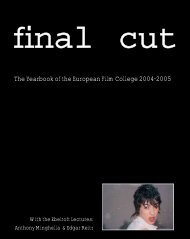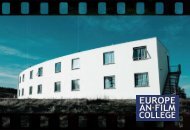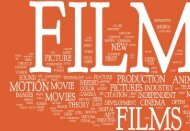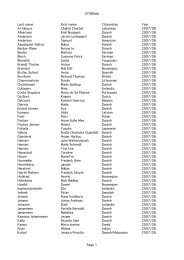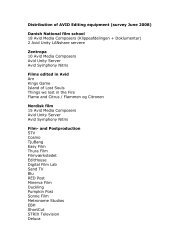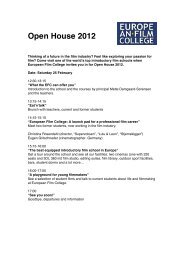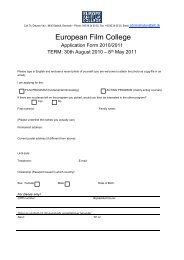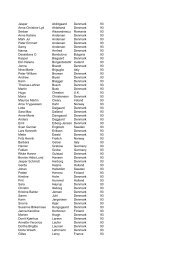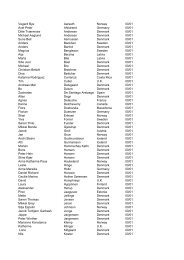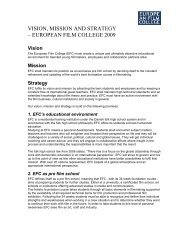yearbook 2004/05 - The European Film College
yearbook 2004/05 - The European Film College
yearbook 2004/05 - The European Film College
Create successful ePaper yourself
Turn your PDF publications into a flip-book with our unique Google optimized e-Paper software.
A step on the journey<br />
By Nahed Awwad<br />
FROM THE STUDENTS<br />
For more than 50 years Palestine has had a media<br />
presence, many foreign TV crews have come<br />
to Palestine to cover the news and make films.<br />
With them, they brought their own equipment,<br />
technician and ideas, which meant that in many<br />
cases they could not really reflect the reality of<br />
our situation. <strong>The</strong>re was a need for home-grown<br />
productions so we could sound our own voice<br />
and frame our own image.<br />
In 1993 the Oslo Agreement came into being,<br />
one of the issues raised was that Palestinians have<br />
the right to own their own visual and audio media.<br />
At that time we didn’t have any experience<br />
in this field, so there was a need to train our<br />
own professionals. Some people already worked<br />
with foreign news channels and others came in<br />
from elsewhere, so there were a few people with<br />
a fair amount of TV experience. My brother’s<br />
friend was one of these people who had worked<br />
with the BBC as a sound person covering news.<br />
It was after hearing his stories that I became interested<br />
in TV and films and as time went on I<br />
realized that it was not only interesting, but an<br />
important, vocation.<br />
Around thirty local TV stations were established<br />
in Palestine, broadcasting on an Ultra High<br />
Frequency (UHF) band that covered limited<br />
areas. <strong>The</strong> stations started out with very modest<br />
equipment, VHS cameras and VTRs, some<br />
computers and a mixer.<br />
After working for two years in a part-time job at<br />
one of the local photography studios in my home<br />
town, Beit Sahour, I was looking for a new challenge<br />
and began work in Al Quds Educational<br />
TV (part of Al-Quds University) in 1997. I was<br />
amongst the first five staff to be hired for this<br />
new television station, which was based in the<br />
city of Ramallah. In the beginning we only had<br />
two rooms, one for administration and the secretary<br />
and the other was the transmission room,<br />
which had a small studio attached. In our first<br />
year we began with broadcasting our logo and a<br />
teletext information page, later on we were able<br />
to show live coverage of the Palestinian Council<br />
and after one year of existence we started broadcasting<br />
our own material. We were broadcasting<br />
for ten hours a day, of which we produced 25%<br />
of the material.<br />
It was a modest start with high expectations<br />
and the feeling gained from building something<br />
from scratch and watching it grow, and growing<br />
with it, was tremendous. After two years of<br />
working in every role at the TV station, from<br />
camera operator to editor to multi-camera director,<br />
I knew that I wanted to specialize in editing,<br />
so I did.<br />
By 2002, there were more than 20 staff members;<br />
we had more equipment, mini DV cameras<br />
and one DVCam VTR and two Avid systems,<br />
but still frequently using SVHS.<br />
In April 2002 the Israeli army invaded most<br />
of the Palestinian cities, including Ramallah.<br />
This created havoc in the city and the Al-Quds<br />
building was occupied by the Israeli army for<br />
nineteen days. <strong>The</strong> building was used a base,<br />
where tanks were parked and soldiers ate and<br />
slept.<br />
When the Israeli army left Ramallah city on<br />
21st April 2002, we rushed to the TV station<br />
to see what was done with our offices and<br />
equipment. It was a terrible scene, doors were<br />
knocked down to ground and trash was everywhere.<br />
It was a distressing scene as we saw all<br />
our effort crumbling before our eyes. However,<br />
this only made us more determined to fix the<br />
damage and go back on air as soon as possible<br />
and so we did after four days of struggling with<br />
fixing what was left, we were able to put our<br />
logo back on air.<br />
After six years of working with Al-Quds, I felt<br />
that I needed to move on. Thus far, I had been



